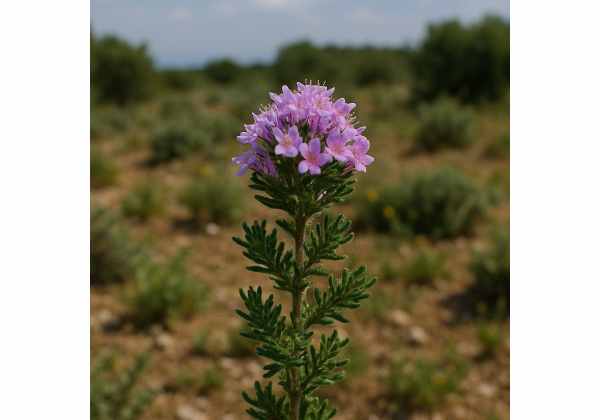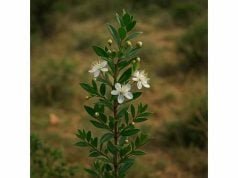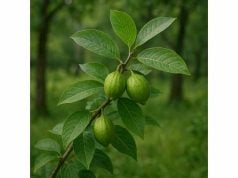
Mediterranean Thyme, a time-honored herb native to the sun-drenched Mediterranean region, has been celebrated for centuries for its remarkable health benefits, potent active compounds, and versatile culinary applications. Rich in natural antioxidants and anti-inflammatory agents, this aromatic herb plays a significant role in both traditional medicine and modern holistic therapies. Its robust profile of bioactive components—such as thymol, carvacrol, and rosmarinic acid—contributes to its antimicrobial, digestive, and respiratory properties. Whether used to enhance the flavor of gourmet dishes or incorporated into natural remedies, Mediterranean Thyme continues to be a cherished natural resource for promoting wellness.
Table of Contents
- Herbal Profile and Visual Characteristics
- Chemical Constituents and Active Ingredients
- Health Advantages and Core Attributes
- Practical Applications and Usage Precautions
- Research Discoveries and Critical Findings
- FAQ
Herbal Profile and Visual Characteristics
Mediterranean Thyme is a perennial herb belonging to the Lamiaceae family and is revered for its delicate appearance and robust aroma. This herb typically exhibits a woody base with slender, branching stems that support tiny, evergreen leaves. The leaves are often a subtle silver-green, intermingled with hints of deep green, and are arranged in a compact, almost cushion-like form. During the blooming season, clusters of small flowers—ranging from shades of lavender and purple to occasional whites—emerge gracefully, adding splashes of color to its rugged, sun-baked habitat.
Native to the rocky, sunlit slopes of the Mediterranean basin, this thyme variety thrives in well-drained soils with minimal fertility, adapting superbly to drought and heat. Its resilience in harsh, arid conditions is a testament to its deep root system, which efficiently scavenges water from dry soils. Gardeners and herbal enthusiasts prize Mediterranean Thyme not only for its culinary versatility but also for its low maintenance and ability to flourish in poor soil conditions. The plant’s aromatic leaves release essential oils when brushed or crushed, exuding an enchanting blend of floral, earthy, and slightly minty fragrances that have captivated senses for generations.
Historically, Mediterranean Thyme has played a pivotal role in numerous cultural practices. Ancient civilizations used it for its antiseptic properties and as a natural preservative in food and even in ritualistic ceremonies. Its significance is evident in classical texts and archaeological findings that recount its use in mummification processes, culinary practices, and even in religious rites. Over the centuries, the herb’s cultivation spread across Europe and into other parts of the world, where local cultivars developed subtle variations in flavor, aroma, and appearance while retaining the distinctive characteristics of its Mediterranean heritage.
Botanically classified under the genus Thymus, Mediterranean Thyme has attracted scientific interest due to its complex chemical profile. Researchers have identified numerous bioactive compounds within its leaves and flowers, each contributing to the herb’s multi-dimensional properties. The plant’s small stature belies a rich reservoir of phytochemicals that not only enhance its medicinal properties but also improve its adaptability to environmental stressors.
In its natural setting, Mediterranean Thyme typically inhabits coastal cliffs, rocky hillsides, and sun-drenched meadows where competition for resources is fierce. Its ability to thrive under such challenging conditions is linked to its efficient nutrient uptake and tolerance to drought. Moreover, its flowering phase is not merely ornamental; it serves as a crucial period for attracting a variety of pollinators, including bees and butterflies, which play essential roles in maintaining ecological balance.
The herb’s cultural and ecological importance is further underscored by its role in sustainable agriculture. Modern organic farming practices have embraced Mediterranean Thyme for its natural pest-resistant properties and minimal requirement for chemical fertilizers. This sustainable cultivation not only preserves the herb’s natural potency but also contributes to soil health and biodiversity in its growing regions.
Furthermore, Mediterranean Thyme’s versatility has inspired a wealth of traditional remedies and modern applications alike. Chefs integrate its unique flavor into a myriad of dishes—from hearty stews to delicate herbal teas—while herbalists extract its potent oils for therapeutic use. This convergence of culinary delight and medicinal efficacy makes Mediterranean Thyme a truly invaluable herb, celebrated both for its historical legacy and its contemporary relevance in health and wellness.
Ancient lore and modern research both attest to the herb’s robust nature and intrinsic beauty. Its vibrant blooms and resilient foliage symbolize the enduring connection between nature and human culture, making Mediterranean Thyme a living link between the past and the present. Whether gracing a rustic kitchen garden or featured in a high-end culinary masterpiece, this herb continues to enchant and heal, embodying the timeless essence of Mediterranean vitality.
Chemical Constituents and Active Ingredients
The remarkable benefits of Mediterranean Thyme are rooted in its rich chemical composition. A closer look at its bioactive profile reveals an array of potent compounds, each contributing to its diverse therapeutic effects. The herb’s effectiveness is largely attributed to the synergy among these constituents, which work together to provide antimicrobial, antioxidant, and anti-inflammatory benefits. Below is a detailed exploration of the key active compounds present in Mediterranean Thyme:
- Thymol:
Thymol is a naturally occurring monoterpenoid phenol renowned for its antiseptic and antioxidant properties. It has been extensively researched for its ability to neutralize harmful bacteria and fungi, making it a powerful natural preservative. Thymol also helps reduce oxidative stress, contributing to improved cellular health and longevity. - Carvacrol:
Carvacrol, closely related to thymol, exhibits formidable antimicrobial and anti-inflammatory properties. This compound is particularly effective in inhibiting the growth of various pathogenic organisms. Carvacrol’s synergistic action with thymol enhances its overall efficacy, making it a key player in respiratory and digestive health support. - Rosmarinic Acid:
A polyphenolic compound, rosmarinic acid is noted for its strong antioxidant capacity. It plays a significant role in neutralizing free radicals, thereby protecting cells from oxidative damage. In addition, rosmarinic acid exerts anti-inflammatory effects, which are beneficial for skin health and joint function, and may reduce the risk of chronic diseases. - Linalool:
Present in smaller quantities, linalool contributes to the herb’s unique aroma and exhibits mild sedative effects. Its calming properties can help alleviate stress and anxiety. Additionally, linalool offers subtle antimicrobial and anti-inflammatory benefits, further enriching the herb’s overall therapeutic profile. - Beta-Caryophyllene:
This sesquiterpene is distinct in its ability to interact with the body’s cannabinoid receptors, potentially aiding in pain relief and stress reduction. Beta-caryophyllene adds a valuable dimension to Mediterranean Thyme’s health-promoting effects, particularly in the realms of anti-inflammatory and analgesic activity. - Eugenol:
Eugenol is a phenolic compound known for its analgesic and antimicrobial properties. It can help alleviate pain and reduce inflammation, making it a supportive component in the treatment of minor injuries and infections. Its presence further bolsters the herb’s reputation as a natural remedy with a broad spectrum of benefits.
Beyond these primary compounds, Mediterranean Thyme contains an assortment of flavonoids, vitamins, and minerals that collectively enhance its medicinal potency. This intricate blend not only fortifies the herb’s natural defenses but also contributes to its overall efficacy in promoting health. Advanced analytical methods, such as gas chromatography and mass spectrometry, have confirmed the presence and concentrations of these compounds, ensuring that each harvest of Mediterranean Thyme offers a unique yet reliably beneficial phytochemical profile.
The variability in the chemical composition of Mediterranean Thyme can be influenced by factors such as geographic location, soil composition, and seasonal changes. As a result, the herb exhibits subtle differences in flavor, aroma, and potency, depending on its growing conditions. This dynamic nature underscores the importance of sustainable cultivation practices, which help maintain the integrity and richness of its bioactive ingredients.
Modern research continues to investigate the therapeutic potential of these compounds, examining their roles in immune modulation, cardiovascular support, and chronic disease prevention. The evolving body of evidence not only validates the traditional uses of Mediterranean Thyme but also paves the way for innovative applications in natural medicine and functional foods. As scientists delve deeper into its chemical intricacies, Mediterranean Thyme stands out as a prime example of nature’s capacity to produce multifaceted remedies that bridge the gap between culinary delight and therapeutic efficacy.
In summary, the chemical constituents of Mediterranean Thyme form the cornerstone of its extensive health benefits. The combined effects of thymol, carvacrol, rosmarinic acid, linalool, beta-caryophyllene, and eugenol provide a robust defense against pathogens, oxidative stress, and inflammation. This well-balanced phytochemical profile is a testament to the herb’s enduring value in both traditional remedies and modern scientific research.
Health Advantages and Core Attributes
Mediterranean Thyme is widely acclaimed for its extensive range of health advantages and intrinsic qualities that promote overall well-being. The herb’s rich concentration of active compounds works synergistically to deliver multiple therapeutic benefits that have been recognized by traditional healers and validated by modern science. One of the foremost benefits of Mediterranean Thyme is its potent antimicrobial activity. The combination of thymol, carvacrol, and eugenol creates a natural barrier against a variety of bacteria, viruses, and fungi, making it an effective remedy for respiratory infections, minor wounds, and skin conditions.
In addition to its antimicrobial properties, Mediterranean Thyme is celebrated for its robust antioxidant capacity. The antioxidants present in this herb help neutralize free radicals, thereby reducing oxidative stress and lowering the risk of chronic diseases such as heart disease and certain cancers. This protective effect is crucial in maintaining cellular integrity and promoting long-term health. Furthermore, the herb’s anti-inflammatory attributes are particularly beneficial in managing conditions such as arthritis, asthma, and inflammatory skin disorders. By reducing inflammation, Mediterranean Thyme helps alleviate pain and improve overall mobility.
Digestive health is another area where Mediterranean Thyme shines. The herb stimulates the production of digestive enzymes, which enhances the breakdown of food and aids in nutrient absorption. Its natural carminative properties also help alleviate bloating and gas, contributing to a more comfortable digestive process. Traditional herbal teas brewed with Mediterranean Thyme are often used to soothe an upset stomach and promote better digestion after heavy meals.
Respiratory wellness is yet another significant benefit attributed to Mediterranean Thyme. The herb’s expectorant qualities help clear mucus from the airways, providing relief from coughs, bronchitis, and sinus congestion. Inhaling steam infused with thyme extracts has been a time-honored remedy for alleviating respiratory discomfort, offering a natural alternative to synthetic decongestants. Alongside these benefits, Mediterranean Thyme also supports cardiovascular health. Its antioxidant and anti-inflammatory properties help maintain healthy blood vessels, reduce arterial stiffness, and promote proper blood circulation—factors that are vital for heart health.
Beyond its physical health benefits, Mediterranean Thyme is also known for its calming and mood-enhancing effects. The subtle sedative properties, attributed largely to compounds like linalool, can help reduce stress and promote relaxation. This makes the herb a valuable component in aromatherapy, where its refreshing aroma contributes to a peaceful and balanced environment.
Centuries of traditional use further attest to the herb’s holistic benefits. Cultures across the Mediterranean region have long incorporated thyme into daily diets and medicinal practices, harnessing its ability to bolster the immune system and enhance overall vitality. The convergence of traditional wisdom and modern research has cemented Mediterranean Thyme’s status as a natural remedy with a broad spectrum of health advantages.
Moreover, the multifaceted nature of Mediterranean Thyme inspires ongoing scientific inquiry. As researchers continue to unravel the molecular mechanisms behind its effects, the herb remains a subject of interest for developing innovative natural therapies. Its comprehensive range of benefits—from fighting infections and reducing oxidative stress to soothing inflammation and supporting cardiovascular function—makes Mediterranean Thyme an indispensable asset in natural medicine.
Beyond immediate therapeutic effects, Mediterranean Thyme encourages a deeper connection with nature’s healing power. Its enduring legacy, cultivated over millennia, serves as a reminder that natural remedies can offer sustainable solutions for modern health challenges. Whether integrated into daily meals, taken as a herbal supplement, or used in aromatherapy, this herb epitomizes the harmonious blend of tradition and science, nurturing both body and spirit.
Practical Applications and Usage Precautions
The versatility of Mediterranean Thyme is evident in its wide range of practical applications, spanning from the culinary arts to natural medicine and even cosmetic formulations. Chefs around the world treasure this herb for its robust, earthy aroma and subtly spicy flavor, which enriches a variety of dishes—from savory meat stews and roasted vegetables to delicate herbal teas and marinades. Its unique taste profile not only enhances the sensory appeal of food but also contributes to its nutritional and health-promoting properties.
In traditional herbal medicine, Mediterranean Thyme is utilized in several forms, including teas, tinctures, and essential oils. When used as a tea, a small amount of dried thyme leaves steeped in boiling water releases beneficial compounds that help alleviate digestive discomfort and boost the immune system. For topical applications, diluted thyme essential oil can be applied to minor cuts, abrasions, or insect bites, harnessing its natural antiseptic and anti-inflammatory properties to promote healing and prevent infection.
Despite its many benefits, it is crucial to use Mediterranean Thyme safely and judiciously. In culinary applications, a small pinch of the herb is typically sufficient to impart flavor without overwhelming a dish. However, when using thyme for medicinal purposes, it is advisable to consult with a healthcare professional—especially for individuals with pre-existing conditions or those taking medications that might interact with the herb’s potent compounds. Overconsumption or improper usage may lead to adverse effects such as gastrointestinal discomfort or allergic reactions.
Proper preparation is key to maximizing the benefits of Mediterranean Thyme while minimizing risks. For instance, when preparing a thyme tea, it is recommended to use one to two teaspoons of dried leaves per cup of boiling water, steeped for five to ten minutes. This method allows for the optimal extraction of active ingredients without releasing any potentially irritating substances. Similarly, when using thyme essential oil, it is essential to dilute it appropriately—typically one to two drops in a teaspoon of carrier oil (such as coconut or almond oil)—before applying it to the skin.
Beyond its medicinal and culinary uses, Mediterranean Thyme is making its mark in the realm of cosmetics and personal care. Its antimicrobial and antioxidant properties render it an excellent ingredient in formulations for natural skincare products, including lotions, shampoos, and acne treatments. The herb’s ability to combat oxidative stress and inflammation contributes to healthier skin and can help delay signs of aging, making it a popular choice among those seeking organic beauty solutions.
In the field of aromatherapy, the diffusion of thyme essential oil creates a refreshing and invigorating atmosphere. The herb’s scent, a harmonious blend of floral and earthy notes, can help reduce stress, enhance mood, and promote mental clarity. Whether used in personal diffusers or as part of professional spa treatments, the calming effect of Mediterranean Thyme adds a soothing dimension to holistic wellness practices.
While the benefits of Mediterranean Thyme are extensive, users must remain mindful of potential safety concerns. Individuals with sensitive skin should perform a patch test before applying diluted thyme oil over large areas. Pregnant or breastfeeding women are encouraged to seek medical advice prior to using thyme in any concentrated form, as the effects of its potent compounds are not fully understood in these populations. Additionally, those with chronic health conditions, particularly respiratory or cardiovascular issues, should consult a healthcare provider to ensure that thyme-based therapies do not interfere with their ongoing treatments.
In summary, Mediterranean Thyme offers a treasure trove of practical applications that can enhance both culinary creations and overall health. Its multifaceted uses—from flavoring food and soothing digestive issues to enriching skincare formulations and promoting respiratory wellness—underscore its value as a natural remedy. Embracing this herb in daily life can lead to a more balanced, healthful, and flavorful lifestyle. As with any potent natural ingredient, proper usage and professional guidance are key to unlocking its full potential while ensuring safety and efficacy.
Research Discoveries and Critical Findings
A growing body of scientific research has shed light on the extensive benefits of Mediterranean Thyme, providing empirical evidence that reinforces its traditional uses. Recent studies have delved into the herb’s antimicrobial, antioxidant, and anti-inflammatory properties, affirming its role as a natural remedy with significant therapeutic potential. Below is a summary of several notable research investigations that have enhanced our understanding of this remarkable herb:
- Study on Antimicrobial Efficacy (2018):
Published in the Journal of Ethnopharmacology, this study examined the antimicrobial properties of Mediterranean Thyme extracts. Researchers discovered that the synergistic effects of thymol and carvacrol were highly effective in inhibiting the growth of various bacteria and fungi. The study highlighted the herb’s potential as a natural preservative and a complementary treatment for microbial infections, suggesting its application in both food safety and clinical settings. - Antioxidant Capacity Research (2019):
Featured in the Journal of Agricultural and Food Chemistry, this research focused on the antioxidant properties of Mediterranean Thyme. The findings demonstrated that the herb’s polyphenolic compounds, particularly rosmarinic acid, played a critical role in scavenging free radicals. This antioxidant activity was linked to reduced oxidative stress, supporting the herb’s potential in preventing chronic diseases associated with cellular damage. - Respiratory Health and Inflammation Study (2020):
Conducted by researchers at a leading European university, this investigation evaluated the anti-inflammatory effects of thyme extracts on respiratory tissues. Results indicated that the application of thyme extract significantly reduced inflammatory markers in airway tissues, providing scientific support for its traditional use in managing conditions such as bronchitis and asthma. This study underlines the herb’s capacity to ease respiratory distress naturally. - Digestive Health Benefits Analysis (2021):
Published in the International Journal of Food Sciences and Nutrition, this study explored the impact of Mediterranean Thyme on digestive processes. The research revealed that thyme stimulated the production of digestive enzymes, thereby facilitating efficient food breakdown and nutrient absorption. Participants reported a reduction in gastrointestinal discomfort, such as bloating and indigestion, when incorporating thyme into their diets, suggesting its potential role in maintaining gut health.
Collectively, these research findings underscore the multifaceted benefits of Mediterranean Thyme and provide a robust scientific foundation for its widespread traditional use. The studies not only validate its antimicrobial, antioxidant, and anti-inflammatory properties but also pave the way for future investigations into its broader applications in natural medicine. As methodologies advance, researchers continue to explore optimal dosages, long-term effects, and potential synergistic interactions between thyme’s bioactive compounds.
Furthermore, the current scientific exploration into Mediterranean Thyme has spurred interest in developing standardized extracts that can be used in clinical trials and commercial formulations. Such advancements hold promise for integrating this herb into mainstream healthcare practices, offering natural alternatives for the management of various health conditions. The convergence of traditional wisdom and modern scientific inquiry ultimately positions Mediterranean Thyme as a vital component in the expanding field of plant-based therapeutics.
FAQ
What are the primary benefits of Mediterranean Thyme?
Mediterranean Thyme is renowned for its antimicrobial, antioxidant, and anti-inflammatory properties. It helps fight infections, supports respiratory and digestive health, and reduces oxidative stress. These benefits, combined with its rich blend of active compounds, make it a versatile herb for both culinary and therapeutic uses.
How should Mediterranean Thyme be used safely?
For safe use, Mediterranean Thyme should be consumed in moderation, whether as a culinary herb or in supplement form. When using thyme essential oil, always dilute it with a carrier oil. Individuals with allergies or on medication should consult a healthcare professional to avoid adverse reactions.
Can Mediterranean Thyme support digestive health?
Yes, Mediterranean Thyme supports digestive health by stimulating digestive enzymes and alleviating gastrointestinal discomfort. Its natural carminative properties help reduce bloating and gas, making it a popular choice in herbal teas and digestive remedies that promote a balanced and efficient digestive system.
What active compounds make Mediterranean Thyme effective?
Key active compounds in Mediterranean Thyme include thymol, carvacrol, rosmarinic acid, linalool, beta-caryophyllene, and eugenol. These constituents are responsible for its antimicrobial, antioxidant, and anti-inflammatory effects, collectively contributing to its wide range of health benefits.
Are there any known side effects or interactions with medications?
Mediterranean Thyme is generally safe when used appropriately; however, excessive consumption may cause gastrointestinal discomfort or allergic reactions. It may interact with certain medications, particularly blood thinners. It is advisable to consult a healthcare provider before starting any thyme-based regimen, especially if you have pre-existing conditions.
Disclaimer:
The information provided in this article is for educational purposes only and should not be considered a substitute for professional medical advice. Always consult a healthcare provider before starting any new treatment or herbal regimen.
If you found this guide helpful, please share it on Facebook, X (formerly Twitter), or your preferred platform, and follow us on social media for more updates on natural health remedies and culinary inspirations.










